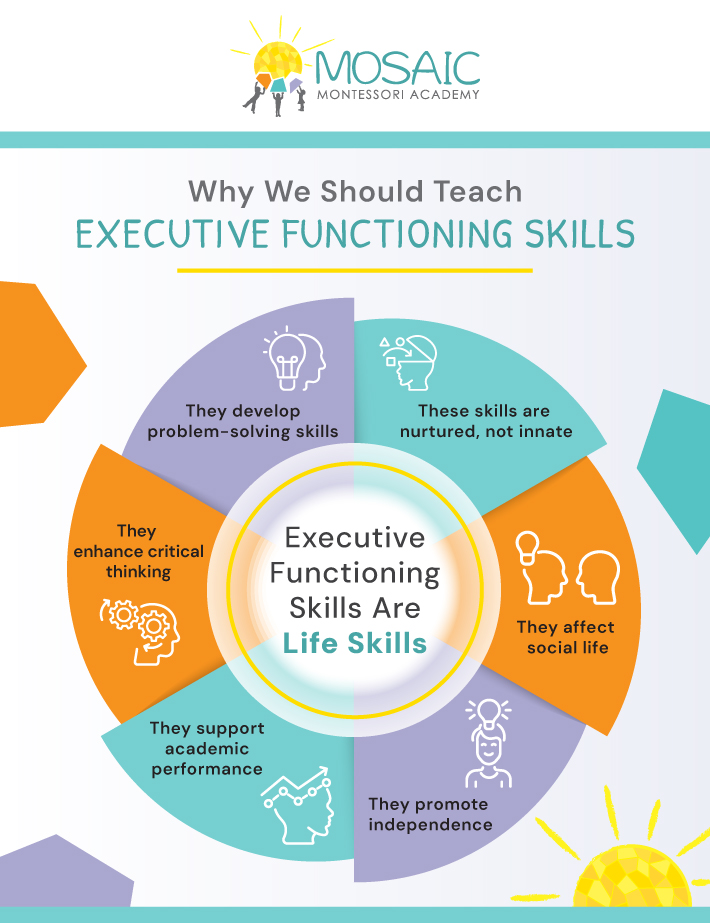A well-rounded education goes beyond just academics. Education should also provide learning environments that nurture skills and help students succeed both inside and outside the classroom.
Opportunities to support executive functioning skills are in every lesson and activity, but classrooms that focus particularly on these skills will tailor the learning experience to each student. To support executive functioning skills, classrooms can organize lesson plans and hands-on activities to train students in real scenarios that require self-directed goal setting.
What Is Executive Functioning?
Executive functioning (EF) refers to a group of cognitive processes that enable people to plan, remember, and manage multiple tasks successfully. The term describes the mental processes required for purposeful, goal-oriented actions. However, it also refers to those processes responsible for mediating socially acceptable conduct.
Our EF is comprised of several component skills, such as:
- Working memory
- Attentional control
- Cognitive flexibility
- Self-regulation
- Strategic planning
- Impulse control
EF skills develop throughout childhood and into adulthood. Without them, people may act impulsively or struggle with everyday tasks, which can lead to difficulties interacting with the environment.
Why Teach Executive Functioning Skills?
We are not born with EF skills. They are developed and nurtured in a supportive environment designed to enhance these skills, which is why both parental interactions and classroom teaching affect a child’s awareness, behaviour, and overall cognitive development.
Executive Functioning Skills Affect Academics
EF can be closely linked to academic performance. Students with strong EF skills can better manage their time, organize their tasks, and approach various challenges with strategic thinking.
Working memory, attentional control, cognitive flexibility, and strategic planning are all necessary for academic success. Good executive functioning also affects social interactions, especially listening and responding.
With these skills, children can successfully navigate classroom interactions and perform well academically. They can also remain engaged with their environment, which supports their cognitive functioning and personal development.
But these skills can also extend beyond the classroom. The more our brains are accustomed to complex cognitive functioning, the more efficiently we can use them in our daily lives.
Executive Functioning Skills Affect Everybody
Through experiences, we build connections in our minds and develop our cognitive abilities. EF skills are important in our early development, but their importance will only grow from there. As we age, we become increasingly reliant on environmental and social interactions, and we’ll need the skills to navigate these interactions.
These skills help us perform our jobs, provide care, maintain the household, manage our finances, and contribute to the community.
In fact, strong EF skills remain important not only for an adult’s success but also for developing those skills in the children around them.
Although executive functioning skills can be maintained and strengthened at any age, they are easiest to develop during childhood alongside other cognitive developments.

What Type of Learning Promotes Executive Function Skills?
Hands-on, play-based learning paired with collaborative and interactive activities can naturally nurture executive functioning skills.
Project-based learning can encourage children to plan, organize, and execute tasks over extended periods of time. This can train critical thinking and problem-solving.
Especially in early education, play is actually work, and toys are the tools. With these tools, children learn more about the world. Play-based learning aims to promote learning and development by encouraging creativity, negotiation, and self-regulation.
Montessori education offers a structured way of familiarizing children with the environment, social expectations, and cultural significance. The Montessori method provides a learning environment that encourages critical thinking and problem-solving while maintaining independence. This way, children can learn from personal experience—from their own interactions with their environment.
Montessori programs personalize students’ learning paths based on their existing development and current skills. The planes of development provide a structured outline of educational opportunities for children to learn.
Montessori education highlights environmental learning and social learning early in childhood to start training children’s executive functioning skills. By directing children towards purposeful tasks like writing and reading, interacting with others, and engaging with the community around them, Montessori schools promote EF skills in children.
How Can Teachers Support Executive Functioning?
Montessori education promotes independence and self-discipline through hands-on learning. By using real scenarios, implementing practical life, and encouraging children to interact with their environment—which means interacting beyond only words and papers—children can engage all of their senses in the learning process.
Teachers in Montessori education act as guides to further foster independence and support EF skills. They observe and help children slowly discover their passions and interests. This approach can make students want to learn rather than forcing them to study a certain curriculum.
Even as guides, teachers should maintain a structured environment. This includes incorporating a strategic curriculum and creating a place for learning. A predictable classroom provides stability that students can familiarize themselves with.

What Do Montessori Classrooms Look Like?
Montessori classrooms have a distinctly multicultural environment with students of mixed ages, where they can interact and learn from each other. Additionally, small-group learning is a common approach in Montessori schools to encourage cooperation, observation, and interest.
In terms of its interior design, the Montessori classroom minimizes visual stimuli and limits distractions. Avoiding clutter promotes focus, but classroom walls can still present relevant visual aids like maps, diagrams, or graphics. This helps create an environment that feels like a place of learning.
Educational structure and visual organization go hand in hand in helping children develop a sense of structure and familiarize them with the idea of place. Making the classroom a place of learning helps children understand that places and people have a purpose and that they are always interacting with each other in meaningful ways. Constant, purposeful interactions allow children to orient themselves toward goals and gradually improve their EF skills, encouraging self-regulation, strategic planning, and cognitive flexibility.
Developing Executive Functioning Skills
Fostering executive functioning skills in the classroom invests in students’ futures. These skills enhance adaptability and problem-solving, building the foundation for lifelong learning.
At Mosaic Montessori Academy, we help develop these skills to positively impact students’ academic performance and personal development. By immersing students in interactive, cooperative learning, students learn to navigate challenges independently.
Contact us today to learn more about how we can prepare your child for life in and beyond the classroom.


